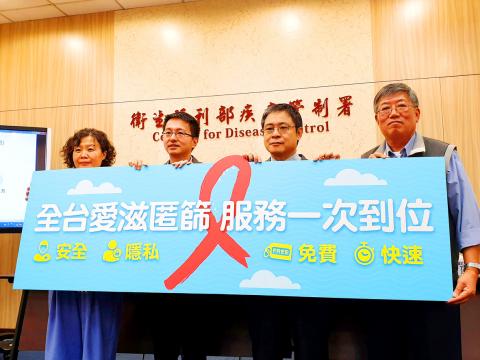The testing process for HIV infection in Taiwan has been streamlined as 12 hospitals nationwide on Monday began to offer anonymous diagnoses within an hour, the Centers for Disease Control (CDC) said.
The new “one-stop” rapid HIV testing service, which detects HIV antibodies in the blood, gives a preliminary result in 20 minutes, it said.
Patients who test positive for the virus are then immediately given a second test that gives a final result within 30 minutes, meaning the process is completed in under an hour, CDC Chronic Infectious Diseases Division head Huang Yen-fang (黃彥芳) said.

Photo: CNA
Treatment for those who test HIV-positive can begin the same day, Huang said told a news conference promoting the new process that hospitals in Taipei, Taoyuan, Hsinchu, Taichung, Tainan and Kaohsiung have started to provide.
Another 47 hospitals have started to provide anonymous, preliminary same-day testing services and would send those whose tests are positive to other medical facilities for a final diagnosis, Huang said.
The test kits used by the new service are the same as used before, when it took two to three weeks for HIV-infected people to receive treatment after taking the initial test, the CDC said.
Under the previous system, appointments were also required for a second test and subsequent treatment, which increased the risk of the virus spreading, it said.
CDC Deputy Director-General Philip Lo (羅一鈞) said that 610 people tested HIV-positive last year in initial tests, but 99 did not return to a hospital for final confirmation.
The new “one-stop” testing service would bridge the time gap between diagnosis and treatment, allowing more patients to receive timely medical and psychological support, the CDC said.
People who have had sexual intercourse should take at least one HIV test in their lifetime, Huang said, adding that people who have had unsafe sex should take at least one HIV test every year.
As of the end of last month, there were about 39,000 people with HIV in Taiwan and more than 18,000 of them have developed AIDS, CDC statistics showed.

The manufacture of the remaining 28 M1A2T Abrams tanks Taiwan purchased from the US has recently been completed, and they are expected to be delivered within the next one to two months, a source said yesterday. The Ministry of National Defense is arranging cargo ships to transport the tanks to Taiwan as soon as possible, said the source, who is familiar with the matter. The estimated arrival time ranges from late this month to early next month, the source said. The 28 Abrams tanks make up the third and final batch of a total of 108 tanks, valued at about NT$40.5 billion

Two Taiwanese prosecutors were questioned by Chinese security personnel at their hotel during a trip to China’s Henan Province this month, the Mainland Affairs Council (MAC) said yesterday. The officers had personal information on the prosecutors, including “when they were assigned to their posts, their work locations and job titles,” MAC Deputy Minister and spokesman Liang Wen-chieh (梁文傑) said. On top of asking about their agencies and positions, the officers also questioned the prosecutors about the Cross-Strait Joint Crime-Fighting and Judicial Mutual Assistance Agreement, a pact that serves as the framework for Taiwan-China cooperation on combating crime and providing judicial assistance, Liang

A group from the Taiwanese Designers in Australia association yesterday represented Taiwan at the Midsumma Pride March in Melbourne. The march, held in the St. Kilda suburb, is the city’s largest LGBTQIA+ parade and the flagship event of the annual Midsumma Festival. It attracted more than 45,000 spectators who supported the 400 groups and 10,000 marchers that participated this year, the association said. Taiwanese Designers said they organized a team to march for Taiwan this year, joining politicians, government agencies, professionals and community organizations in showing support for LGBTQIA+ people and diverse communities. As the first country in Asia to legalize same-sex

MOTIVES QUESTIONED The PLA considers Xi’s policies toward Taiwan to be driven by personal considerations rather than military assessment, the Epoch Times reports Chinese President Xi Jinping’s (習近平) latest purge of the Chinese People’s Liberation Army (PLA) leadership might have been prompted by the military’s opposition to plans of invading Taiwan, the Epoch Times said. The Chinese military opposes waging war against Taiwan by a large consensus, putting it at odds with Xi’s vision, the Falun Gong-affiliated daily said in a report on Thursday, citing anonymous sources with insight into the PLA’s inner workings. The opposition is not the opinion of a few generals, but a widely shared view among the PLA cadre, the Epoch Times cited them as saying. “Chinese forces know full well that